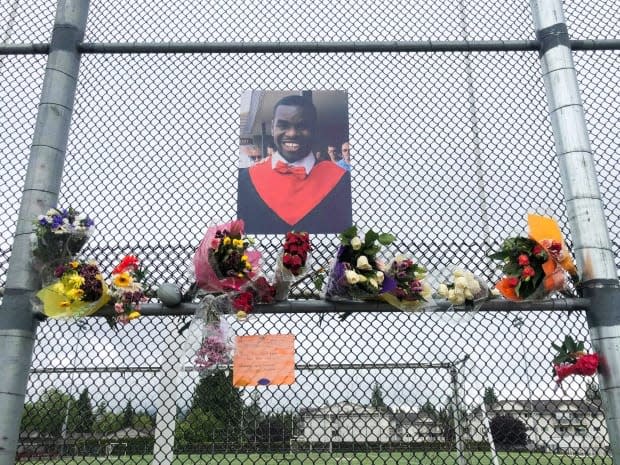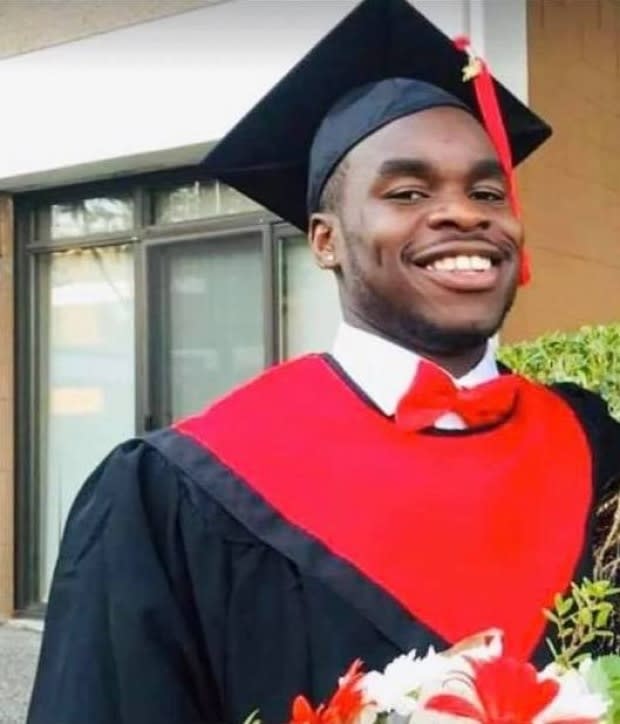Samwel Uko's family says he sought medical help hours before he was found dead in Wascana Lake

Samwel Uko was always known for his smile.
His father and uncle recall the surprise on the nurse's face as she helped birth him.
"What kind of a kid is born smiling?" they remember her asking.
Uko was found dead in Wascana Lake on Thursday. His family says he died by suicide after seeking help at a Regina hospital.
The Saskatchewan Coroners Service confirmed Uko's body was found in the lake, but wouldn't confirm the cause of death, saying an investigation is underway.
Uko's legacy lives on in his smile and the way he uplifted his friends and family.
His uncle Justin Paul, whom Uko greatly admired, said "he was really really loved by everyone else because of how he smiled, how he approached people, how he talks to people, how he cares about people. He was just a very bubbly person. He will be dearly missed."
'Football was his life'
Uko was originally from what is now South Sudan. His family came to Canada as refugees in 2005.
He started playing football soon after his arrival in his new home of Abbotsford, B.C. The sport became his passion.
"Football was his life," Paul says. "That's all he wanted to do."
Mat Macri coached Uko when he first started playing with the Abbotsford Falcons. Macri remembers Uko not being afraid to play by his own rules.
"A lot of times you stood there on the sideline of the field with your jaw on the ground because he did something so wild you could not comprehend it."
Uko's talent earned him a spot on the University of Saskatchewan Huskies, where he played for a season.
But beneath the contagious smile and the slick touchdowns, Uko needed help.

His family in Regina said Uko was hearing voices in his head, and was pacing and hiding around the house while visiting them last week. His cousin drove him to the Regina General Hospital emergency room on Thursday, but wasn't able to wait with him due to COVID-19 rules prohibiting visitors in hospitals.
As a B.C. resident, Uko was required to fill out forms before he could get help.
"Given his condition, it was just another thing for him to do and he was not mentally ready to do," Paul said.
Rebecca Rackow, a policy director at the Canadian Mental Health Association, said it's necessary for family members and other support systems to accompany people with mental health issues, as they might struggle to understand processes such as application forms or to clearly express their situations to healthcare workers. They can also help provide support once the person is released.
"If you don't allow for that support person then you don't know where they're going to go when they leave and how that's going to play out," Rackow says.
Uko kept telling hospital staff that he needed help, as seen in a Snapchat video that he posted.
In an email, the Saskatchewan Health Authority (SHA) said, "Our emergency department staff are trained to respond to people in all health crises," and called it, "heartbreaking to see this young man's distress."
The SHA said it is currently conducting an investigation to find more details of Uko's visit. The Saskatchewan Ministry of Health deferred to the health authority's response and didn't offer comment.
After leaving the hospital Uko returned to his relatives' home and stayed in his room for a few hours.
Then he jumped out of a window and headed to Wascana Lake.

'I need help'
Before his final moments, Uko wrote on Facebook, "I need help." He also texted his former teacher, "Please help me, they are after me, they are coming to kill me."
His uncle and father said they didn't see any signs until he was hearing voices in his head that Uko had mental health issues.
"We did not have any background knowledge on it … there were no symptoms of anything … we never talk about it because there's nothing to mention," Paul said.
Suicide is the second leading cause of death among youth and young adults. Of the approximate 4,000 deaths by suicide each year, more than 90 per cent were living with a mental health problem or illness, according to Statistics Canada.
Burying his eyes in his hands, Paul said he wishes he could have done more.
"I couldn't help my nephew and he needed me. I'm sure he needed me but I couldn't help and it kills me," he said.
Uko's father and uncle hope sharing his story will help stop the stigma surrounding mental health.
"We as a society have to take mental health seriously," Paul said. "There has to be ways or tools to help people get help … it has to be more easy to get it."

Macri, Uko's former coach, agreed that more needs to be done.
"The number one thing right now is that these kids don't feel like they can talk about it without being labelled as soft," he said. "There is such a stigma that we need to realize normal is the abnormal here."
A petition to increase mental health services across Canada has been launched on Uko's behalf.
As of Tuesday afternoon, the petition has more than 600 signatures.
Where to get help:
Canada Suicide Prevention Service: 1-833-456-4566 (phone) | 45645 (text) | crisisservicescanada.ca (chat)
In Quebec (French): Association québécoise de prévention du suicide: 1-866-APPELLE (1-866-277-3553)
Kids Help Phone: 1-800-668-6868 (phone), Live Chat counselling at www.kidshelpphone.ca.
Canadian Association for Suicide Prevention: Find a 24-hour crisis centre.
Hope for Wellness Help Line at 1-855-242-3310 or chat online at hopeforwellness.ca.

